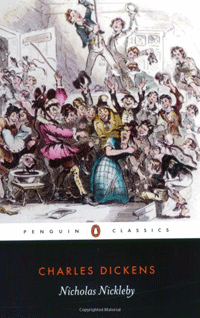Review loosely based on Nicholas Nickleby by Charles Dickens

I have a confession. In all those bookworm lists that go round on emails or social networking sites I usually score pretty well. Although I did not study English Literature at university, I have always tried to get a balance between the classics and the moderns, and different cultures and genres, as well as the latest prize-winners.
However, until recently, I had never read Charles Dickens. I do have a rough recollection of reading A Christmas Carol one summer holidays as a teenager, but cannot remember the experience; and I feel like I read David Copperfield since my husband agonised over it for a year!
Thank goodness for Reading Groups.
I have the opportunity of reading Nicholas Nickleby. Annoyingly, it is the only one of his novels which is out of print at the moment; but my son tracked it down in his school library.
I was a little dismayed at the size. After the first two-week borrowing period elapsed, I was embarrassed to ask my son to renew the book! It is not that I failed to be gripped by the plot, or was not appreciating the finely-drawn characters, or found the writing too dense. On the contrary, I wanted to savour every word! I also wanted to appreciate every detailed illustration in the Penguin Classics edition. I even went to the trouble of following up the notes, to see the historical and cultural references.
What wit! What strength of purpose! What an insight into human character and the degradations of society!
I am thoroughly absorbed; so absorbed that I have become a little Dickensian in my expressions and in my viewing of the world. In the last 170 years have we become blind to the social and moral sin around us? Or, as Dickens challenges us, the moral sin within us?
Reading it made a quote read out in last Sunday's sermon more pertinent:
If prosperity is regarded as the reward of virtue it will be regarded as the symptom of virtue. [Humanity] will leave off the heavy task of making good [people] successful. [We] will adopt the easier task of making out successful [people] good. (G.K. Chesterton)
In reading Dickens I can see the Christ-informed virtues of his heroes amidst the drama of their desperate circumstances.
When Nicholas defends the abused schoolboys from their sadistic schoolmaster, I can see Jesus uprooting the money-changers' tables in the Temple courts.
When Kate Nickleby protects her chastity despite the attentions of "gentlemen" with far more lust and leisure than good character, I can see a transformed Samaritan woman, her honour restored by a conversation with Jesus.
When Ralph Nickleby betrays his relatives and overlooks much sin for the sake of greed, I see the rich young ruler walking away dejectedly after Jesus has challenged him about his wealth.
The high calling of a virtuous life, celebrated in this novel, has been replaced by the celebration of those with a successful life measured in wealth or celebrity or sporting achievement.
Stories are beautiful in their ability to turn the mirror to our personalities and souls. We may defend ourselves against accusations, but find ourselves confronted by the like responses of a character we despise.
That is why immersion in the Bible is so profitable. Through story and wisdom, teaching and history, letters and visions, conversations and poetry, God gently - and sometimes violently - forces us to confront our need for reconciliation with him, those around us and his glorious creation.





















